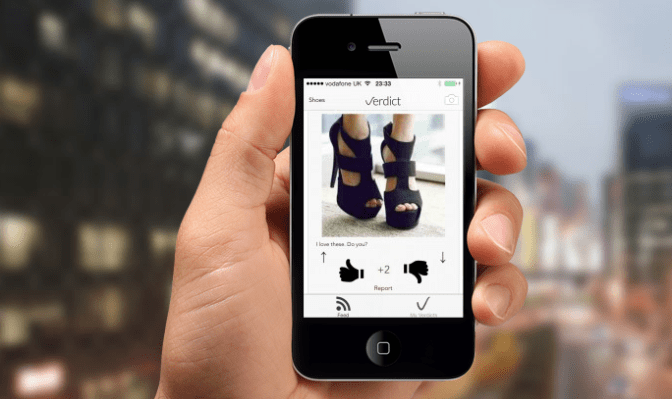What do tech-savvy young people get up to these days? Well, if they’re anything like the two 18 year-old founders of Verdict, a new app for iOS that can be thought of as a ‘Hot or not‘ for just about anything, then when not building apps and websites, they’re interning at VC firms and Microsoft, before putting University on hold to found a startup of their own.
Now, admittedly, Verdict doesn’t feel like the most original app idea. Users snap a photo, upload it to Verdict, add a short description and category, and begin soliciting a thumbs up or thumbs down from other users of the app. Not only does it riff off the old ‘Hot or not’ concept, but also has similarities to U.S.-based polling app Thumb.
The difference, says its young makers, is that activity on Verdict is entirely anonymous. The idea being that anonymity will produce more honest feedback when asking people to rate a potential product purchase or one you’ve already made — though there’s nothing really stopping the app being used to rate just about anything.
“The app idea came from Snapchatting a picture of my new shoes to my entire list and asking for their verdict,” Verdict co-founder Reid Jackson tells TechCrunch. “I realized that everyone is interested in what the world thinks of them, and if there was a way to do it anonymously the responses might have been more positive!”.
Specifically, he says the app has been designed to solve the problem of “trying to get an opinion on a product, outfit, something that you own or are considering buying”.
Harking back to the Internet of yesteryear, Verdict isn’t the only social app in recent times to feature anonymity as a key feature. Here I’m thinking of things like Whisper, the secret sharing app backed by Lightspeed Venture Partners , Unface.me, the Gossip Girl-style app for anonymously trolling your friends, photo sharing app Rando, and the anonymous meme generator Yarrly.
As Andrew Keen says, the Internet needs to learn to forget, but what these apps have in common is they believe in certain settings and relating to identity, it’s better not to remember in the first place. In the case of Verdict, its founders hope that anonymity means users will judge the picture, not the user who posted it.
Finally, more on Verdict’s relatively young but by no means inexperienced founders. At age 13, Jackson, an American who moved to London when he was five, founded Schoolhouse, a social network for under-17s that used a unique school verification system, before founding Calfix, a social calendar that grew to 200,000 users. He’s also interned for Philadelphia mayor Michael Nutter, and at venture capital firm Seventysix Capital. Jackson’s first iPhone app, Scribbler, enables users to compile essays from a few keywords and has seen 40,000 downloads.
Verdict’s other founder, Harry Elliot, worked for Microsoft in the U.S., aged 16, and I’m told has worked with both Apple and Google on various projects. In 2013, Elliot worked for London-based startup, Grallo. He has also been contracted by Members of Parliament in the UK and several charities, professional sports teams and education professionals to build systems.
Jackson and Elliot’s latest app isn’t the first startup idea they’ve worked on together, either. They previously founded Idealist, a website that connects business partners in exchange for equity.
